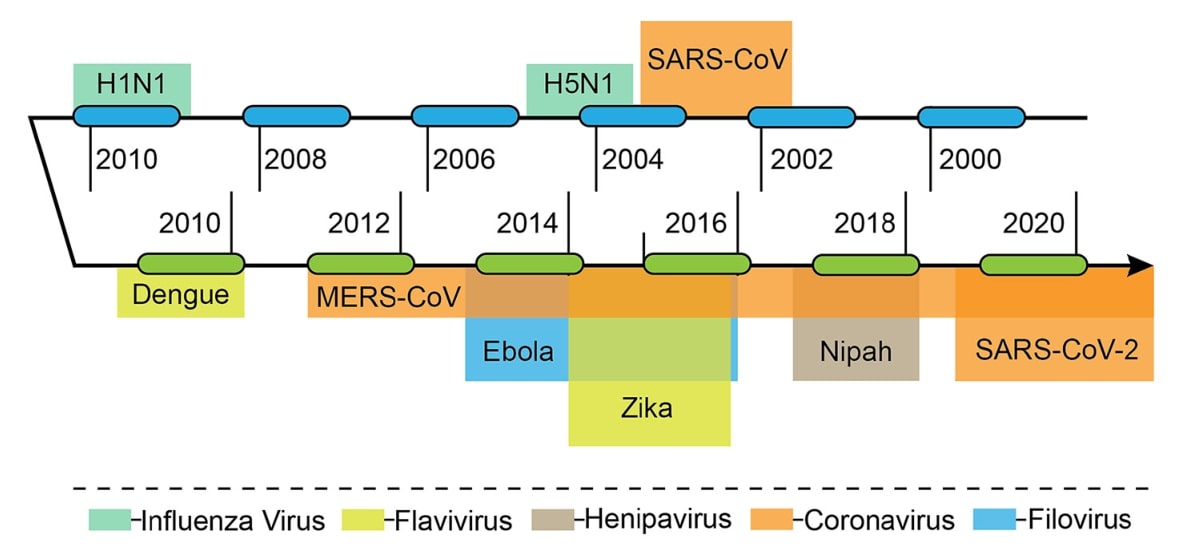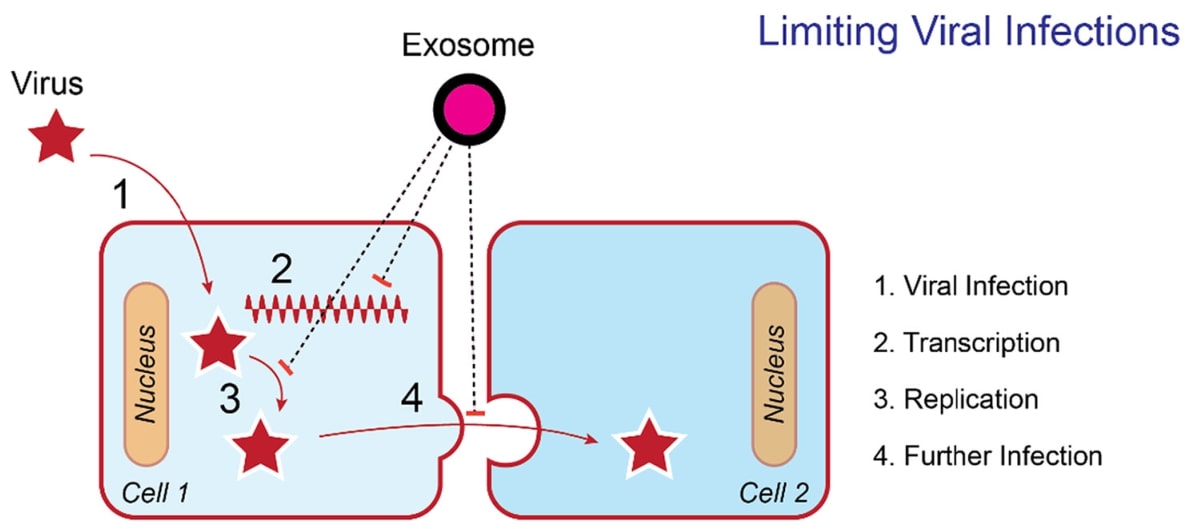Therapeutic Exosomes for Virus Infection
With the global spread of COVID-19, interest and anticipation for the development of exosome-based antiviral drugs has reached an unprecedented level. Exosomes carrying large amounts of information have emerged as promising drug delivery vehicles for the treatment of viral-induced diseases. With years of experience in exosome-related research, Creative Biolabs is confident to provide high-quality exosome development services related to the treatment of virus infection.
Overview of Virus Infection
Virus infection is the process by which disease-causing viruses invade human cells, rely on intracellular nutrients and genetic material for parasitic reproduction, disintegrate the cells and spread further. Virus infection activates the body's immune and inflammatory response, which ultimately manifests as immune clearance of the virus or damage caused by inflammation. Human-to-human, human-to-animal and environmental transmission-related routes of activity have accelerated the mutation and prevalence of diseases caused by virus infection worldwide, accompanied by multiple chronic complications. Each outbreak and mutation of viral infectious diseases over the past decades has led to increased global morbidity and mortality, including SARS, H5N1, H1N1, MERS, Ebola, and COVID-19, which pose a significant threat to public health security. At the same time, there is still a lack of effective drugs to eradicate many diseases caused by viral infections. For example, human immunodeficiency virus (HIV), dengue virus, and avian influenza virus (AIV). In short, diseases caused by viral infections can have devastating effects on humans, both physiologically and economically.
 Fig.1 Timeline of viral infections witnessed in the last two decades (2000–2020, and present). (Chaudhari, 2022)
Fig.1 Timeline of viral infections witnessed in the last two decades (2000–2020, and present). (Chaudhari, 2022)
Therapeutic Exosomes for Virus Infection
A potential mechanism for treating diseases caused by viral infections is to block the entry of the virus or interfere with the process of replication and maturation of the virus. However, the use of high-dose antiviral drugs still has limitations in terms of toxic side effects and narrow therapeutic window. As a naturally highly biocompatible vesicle, exosomes qualify as potential antiviral drug candidates, not only for the therapeutic potential of their intrinsic properties, but also as carriers allowing the targeting of drugs to specific tissues. More notably, exosomes are suitable for mass production through aseptic processing, which offers promising opportunities in the fight against viral infections.
The therapeutic potential of exosomes in viral infectious diseases has been supported by a wealth of data from preclinical trials. For example, MSC-derived exosomes can interfere with the process of viral infection by modulating the immune response and reducing inflammation, while both macrophage-derived and CD8+ T lymphocyte-derived exosomes can interfere with the viral replication process by delivering INF-α. In addition, exosomes harboring specific antiviral miRNAs or glycoproteins have shown the possibility of developing exosome-based antiviral vaccines, including exosomes engineered to express spike proteins for anti-coronavirus, and exosomes delivering miR-122 or miR-355-5p for anti-HBV replication and hepatocellular carcinoma cell invasion. Exosomes engineered to express the gp350 glycoprotein showed anti-EBV effects based on the reduction of EBV infection of B cells by interaction with CD21. Interferon induced transmembrane protein 3 (IFITM3) is an immune protein that prevents virus endocytosis and neutralizes viral virulence, and it was found that exosomal vaccines developed based on the non-toxic structure of the virus were able to deliver IFITM3 and elicit a higher antibody response compared to adenoviral vector vaccines.
 Fig.2 Dual role of exosomes in limiting the viral infections. (Chaudhari, 2022)
Fig.2 Dual role of exosomes in limiting the viral infections. (Chaudhari, 2022)
Exosomes enhance host immune responses and antiviral effects in a variety of diseases caused by viral infections and control the targeted biodistribution of drugs, which paves the way for the refinement of current disease treatment and prognosis protocols. Creative Biolabs is closely following research advances in exosome-based disease treatment and can provide you with high quality and efficient exosome research services for viral infections. Please contact us to discuss your needs.
Reference
-
Chaudhari, P.; et al. Multifunctional role of exosomes in viral diseases: From transmission to diagnosis and therapy. Cell Signal. 2022, 94: 110325.
For Research Use Only. Cannot be used by patients.
Related Services:

 Fig.1 Timeline of viral infections witnessed in the last two decades (2000–2020, and present). (Chaudhari, 2022)
Fig.1 Timeline of viral infections witnessed in the last two decades (2000–2020, and present). (Chaudhari, 2022)
 Fig.2 Dual role of exosomes in limiting the viral infections. (Chaudhari, 2022)
Fig.2 Dual role of exosomes in limiting the viral infections. (Chaudhari, 2022)









